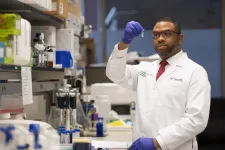(Press-News.org) Laura Riesenberg was visiting a local amusement park with three of her children when she suffered a massive heart attack.
"I was down for about 20 minutes and they defibrillated me twice on site, possibly three times," she says. "Obviously, I was unaware of it. I know from reading the reports what happened."
"I was extremely fortunate that someone found me within seconds of collapsing," says Riesenberg. "Had it happened anywhere else I wouldn't be talking to you right now. If I had been in the basement doing laundry, I would have been in trouble."
The 51-year-old Loveland, Ohio, resident was transported to UC Health's West Chester Hospital where she learned she was a Type 2 diabetic and had suffered previous damage to the heart that led to a big blockage of her left coronary artery while at the amusement park. That type of blockage is often referred to as the "widow maker."
Donald Lynch Jr., MD, assistant professor at the University of Cincinnati College of Medicine and UC Health cardiologist, says that the link between diabetes and heart disease often leads to adverse health outcomes for patients. Approximately 65% of deaths among patients with diabetes are due to cardiovascular disease.
Lynch, also Riesenberg's current cardiologist, will be presenting preliminary research virtually at the American College of Cardiology on Saturday, May 15, that suggests plasma proteins discovered in the blood samples of diabetic patients who went on to develop obstructive coronary disease (OCAD) may serve as biomarkers of severe heart blockage. The findings might benefit patients like Riesenberg in the future.
Riesenberg says an internal defibrillator was implanted in her heart after her heart attack.
"There was no explanation why I survived the first heart attack or second heart attack. They also diagnosed me as diabetic that day. Mind you, I should have known. I had been a gestational diabetic, and I had been overweight, but I thought I was doing all the right things."
"I had lost a significant amount of weight, and I was active. I was eating well or at least I thought I was eating well. I had absolutely no idea," she adds. "I wish someone had been able to tell me that there was a strong link between diabetes and heart disease."
Riesenberg, a homemaker, and her husband, Jay, are both diabetic and they worry if their medical hereditary history might someday impact their family; in addition to the three children who joined their mom at the park the couple have another seven.
As part of his research Lynch, a researcher in the UC Division of Cardiovascular Health and Disease, looked at stored plasma samples from 70 diabetic patients: one group was found to have obstructive coronary disease while the second group did not. A total of 248 plasma proteins were identified; 15 were present in patients with obstructive coronary disease while only three were present in patients without OCAD.
"We took samples of plasma and used mass spectrometry to see if we could find biomarkers that were predictive of patients developing obstructive coronary disease," says Lynch. "The significance of this is I see patients who have diabetes and unfortunately develop blockages but no symptoms."
Lynch says Riesenberg was fortunate that she survived her heart attack and cardiac arrest. "For many patients that's not the case," he says. "We know patients with diabetes are much more likely to have blockages in the heart and unfortunately they are more likely to be asymptomatic which places them at significant risk. We don't have good tools to figure out which patients will develop blockages."
"What we found is that we can use a blood test and identify patients with diabetes who might develop obstructive coronary disease," says Lynch. "It is a challenge to identify which patients with diabetes are at higher risk. This may be a good tool in our toolbox to help us in our fight against cardiovascular disease in patients with diabetes."
"We can get them to a provider and have them assessed early for the possibility of developing obstructive coronary disease," says Lynch.
The research is particularly important to Lynch, who disclosed he also battles diabetes. He has planned future studies to further evaluate the ability of these biomarkers to identify patients with coronary disease and improve cardiac outcomes for patients with diabetes.
The preliminary research has definitely captured the interest of Riesenberg, who spoke with Lynch about his findings.
"It fascinates me that a simple blood test might be able to tell my children that this is on their horizon, and you don't have to be dependent on a cardiac device for the rest of your life," says Riesenberg.
INFORMATION:
Other research co-authors from UC include David Hui, PhD, professor of pathology and laboratory medicine along with Auriela Howze, a UC undergraduate majoring in chemistry. Additional co-authors include Koen Raedschelders, PhD, Jennifer Van Eyk, PhD, and Mitra Mastali, PhD, all of Cedars-Sinai Medical Center, Los Angeles and James Januzzi, MD, of Massachusetts General Hospital, Boston.
Funding for the research is from Cedars-Sinai Advanced Clinical Biosystems Research Institute, University of Cincinnati College of Medicine Department of Internal Medicine Rehn Family Research Award.
Pregnant Aussie mums are being denied access to medications which treat severe nausea and vomiting by pharmacists and medical practitioners because of misleading labels and a lack of awareness about clinical guidelines.
A new study surveyed 249 Australian women who suffered from severe nausea and vomiting during pregnancy (NVP) or hyperemesis gravidarum (HG) and examined their experiences in accessing medications during pregnancy.
One in four women reported being denied medications for NVP/ HG at some stage during pregnancy. This most commonly involved the over-the-counter medicine doxylamine and interactions ...
PHOENIX, Ariz. -- May 13, 2021 -- In the largest study of the associations between smoking and cardiovascular disease on cognitive function, researchers at the Translational Genomics Research Institute (TGen), an affiliate of City of Hope, found both impair the ability to learn and memorize; and that the effects of smoking are more pronounced among females, while males are more impaired by cardiovascular disease.
The results appear today in the journal Scientific Reports.
Previous attempts to quantify cognitive function among smokers and assess sex differences produced mixed results. The TGen researchers attribute this to the limited size of previous data sets. By ...
College Park, Md. - Companies have often considered app adoption among their customers to have a positive impact on customer spending. According to new research from marketing professor P.K. Kannan at the University of Maryland's Robert H. Smith School of Business, higher app adoption among hotel chains could be linked to lower spending among lower-level loyalty customers, who are more likely to use apps to get the best deals.
Kannan worked with Xian Gu, an assistant professor of marketing at Indiana University, for the research, published as "The Dark Side of Mobile App Adoption: Examining the Impact on Customers' Multichannel ...
When a piece of conducting material is heated up at one of its ends, a voltage difference can build up across the sample, which in turn can be converted into a current. This is the so-called Seebeck effect, the cornerstone of thermoelectric effects. In particular, the effect provides a route to creating work out of a temperature difference. Such thermoelectric engines do not have any movable part and are therefore convenient power sources in various applications, including propelling NASA's Mars rover Perseverance. The Seebeck effect is interesting for fundamental physics, too, as the magnitude and sign of the induced thermoelectric current is characteristic of the material and indicates ...
A small drug molecule that appears to protect normal tissue from the damaging effects of radiation, may simultaneously be able to boost the cancer-killing effect of radiation therapy, according to a new study led by scientists at University of Iowa, University of Texas Southwestern Medical Center, and Galera Therapeutics, Inc.
The study, published online May 12 in Science Translational Medicine, suggests that the drug's dual effect is based on a fundamental difference between the ability of cancer cells and healthy cells to withstand the damaging effects of a highly reactive molecule called hydrogen peroxide, which is produced during the dismutation of superoxide.
The drug, known as Avasopasem manganese, is made by Galera Therapeutics. ...
The stock market is a staple of business news, but it is unclear how meaningful stock prices are to the larger economy. Do changes in stock prices directly affect shorter-term consumption, or are they just leading indicators for subsequent economic activity? The U.S. Federal Reserve, for its part, usually seems to act as if stock-based wealth does help drive spending and employment. But is this correct?
A new study co-authored by an MIT economist brings data to the discussion and finds that increased stock market wealth has moderate but clear economic effects. After looking at the U.S. on a county-by-county basis, the study finds that after large market ...
Sydney, Australia; New York City, USA (May 13, 2021)--In a collaborative report published today in Cell, scientists from Sydney and New York describe the critical worldwide need to improve the diversity of cells used in medical research. Currently, 95% of all human cell lines used in research are of European descent. The authors provide actionable steps that researchers and the biomedical community can take to promote more inclusivity in preclinical and basic science research.
The commentary, "Ancestry Matters: Building inclusivity into preclinical study design," is co-authored by Sophie Zaaijer, PhD, who co-founded FIND Genomics (findgen.bio), a company that aims to improve reproducible ...
The once-abundant California condor briefly went extinct in the wild, with only 22 individuals living in captivity by 1982. Today, 300 condors live freely in the wild and another 200 are in captivity. But, despite the condor's struggles, a new study of the California condor genome reported in the journal Current Biology on May 13 has found a surprising amount of genetic diversity.
The study is the first to begin quantifying diversity across the entire California condor genome, which offers researchers needed baseline information to inform future research and conservation of this iconic species, ...
New York, NY (May 13, 2021)-- Artificial food colorants can cause disease when the immune system has become dysregulated, Icahn School of Medicine at Mount Sinai researchers report. The study, published in Cell Metabolism in May, was the first to show this phenomenon.
The study, conducted in mice, found that the mice developed colitis when they consumed food with the artificial food colorants FD&C Red 40 and Yellow 6 when a specific component of their immune system, known as cytokine IL-23, was dysregulated. While it remains unclear whether food colorants have similar effects in humans, researchers plan to investigate exactly how cytokine IL-23 promotes the development of colitis after food colorant exposure.
Colitis is a form of inflammatory bowel disease (IBD), and cytokine ...
Fossilised footprint tracks, recently discovered within the Hanna Formation in Wyoming, USA, which have been dated to 58 million years ago, may represent the earliest evidence of mammals gathering by the sea, according to a study published in Scientific Reports. The findings suggest that mammals may have first used marine habitats at least 9.4 million years earlier than previously thought, in the late Paleocene (66-56 million years ago), rather than the Eocene (56-33.9 million years ago).
Drs. Anton Wroblewski and Bonnie Gulas-Wroblewski examined and photographed over 1,000 metres of fossilised footprints in an area dated back to 58 million years ago by plant and pollen fossils. The authors identified various different tracks. One set showed relatively large, five-toed ...



